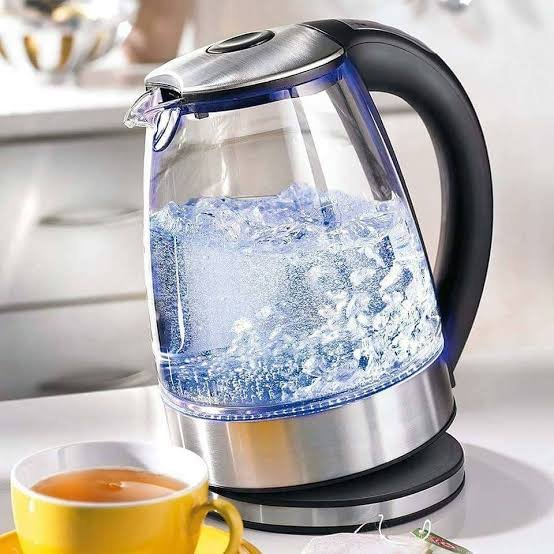The Electric Kettle: Your Everyday Hot Beverage Companion A Comprehensive Buying Guide
The Electric Kettle

The electric kettle is an indispensable appliance in nearly every home and office today. It's crucial for quickly and easily preparing a wide range of hot beverages, from tea and instant coffee to quick soups and herbal infusions. But what exactly is an electric kettle? What criteria should you consider when choosing the best one? And what are its potential advantages and disadvantages? Let's dive into this comprehensive guide.
What is an Electric Kettle?
At its core, an electric kettle is an electrical appliance designed to boil water rapidly and efficiently. It typically consists of a jug or pitcher equipped with a built-in electric heating element at its base. When the kettle is switched on, this heating element converts electrical energy into heat, progressively raising the water's temperature until it reaches boiling point. Most modern kettles feature an automatic shut-off function that activates once the water boils, ensuring safety and saving energy.
Criteria for Choosing the Best Electric Kettle
With a plethora of options available on the market, selecting the best electric kettle can be a daunting task. Here are the most important criteria to consider when making your decision:
1. Capacity
Kettle capacities vary significantly, ranging from small 0.5-liter models ideal for single servings to 1.7 liters or more for family or office use. Determine the capacity that best suits your daily needs to avoid constantly refilling the kettle.
2. Material
The material of the kettle significantly impacts its durability, aesthetics, and even safety.
* Plastic: Lightweight and often inexpensive, plastic kettles can sometimes retain odors or stains over time. Some lower-quality plastics may also release harmful substances when heated, though reputable brands typically use food-grade, BPA-free plastics.
* Stainless Steel: A highly popular choice, stainless steel kettles are durable, easy to clean, and resistant to rust. They are an excellent all-around option for most users, often providing good insulation to keep water hot longer.
* Glass: Elegant and visually appealing, glass kettles allow you to watch the boiling process, which many find satisfying. However, they are more fragile and require more careful handling. They can also show limescale buildup more readily.
* Ceramic: These kettles offer a beautiful, often vintage-inspired aesthetic that can add a decorative touch to your kitchen. They are, however, heavier and more susceptible to breakage if dropped.
3. Wattage (Power)
The wattage of a kettle directly correlates with its boiling speed. Most kettles range between 1500 and 3000 watts. If you're looking for quick boiling times, opt for a kettle with higher wattage. Higher wattage means more power dedicated to heating, resulting in faster performance.
4. Additional Features
Modern electric kettles come equipped with various features that enhance convenience and safety.
* Automatic Shut-off and Boil-Dry Protection: These are essential safety features. Automatic shut-off turns the kettle off once the water has boiled, preventing overheating. Boil-dry protection automatically switches off the kettle if it's accidentally turned on without enough water, preventing damage to the heating element and reducing fire risk.
* Temperature Control: A highly desirable feature for connoisseurs of specific hot beverages. This allows you to set the water to a precise temperature (e.g., 80°C for green tea, 90°C for French press coffee), optimizing flavor extraction and avoiding scalding delicate ingredients.
* 360-Degree Swivel Base: This design allows you to place the kettle on its base from any angle, making it convenient for both left- and right-handed users.
* Water Level Indicator: A clear window or gauge that helps you easily see how much water is inside the kettle, preventing overfilling or underfilling.
* Removable Filter: Often located in the spout, a removable and washable filter helps trap limescale particles, ensuring clean pours and prolonging the kettle's lifespan. Regular cleaning of this filter is crucial, especially in hard water areas.
* Ergonomic Handle and Wide Opening: A comfortable handle makes pouring easy and safe, while a wide opening simplifies both filling and cleaning the interior of the kettle.
* Keep Warm Function: Some advanced models can maintain the water at a set temperature for a period after boiling, useful if you need hot water intermittently.
5. Brand and Warranty
Always opt for a kettle from a reputable brand known for its quality and customer service. Check for a valid warranty, which provides peace of mind and support in case of any issues. A good warranty reflects the manufacturer's confidence in their product.
Advantages of an Electric Kettle
* Speed and Efficiency: Electric kettles boil water significantly faster than stovetop kettles, making them ideal for quick preparations.
* Ease of Use: They are incredibly simple to operate, often requiring just the flick of a switch.
* Safety: Most modern kettles come with advanced safety features like automatic shut-off and boil-dry protection, minimizing risks.
* Versatility: Suitable for preparing a wide range of beverages and food items that require hot water.
* Diverse Designs: Available in a multitude of designs, colors, and finishes to complement any kitchen décor.
* Portability: Many models are cordless, making them easy to move around the kitchen or even to another room.
Potential Disadvantages of an Electric Kettle
* Energy Consumption: While efficient for rapid boiling, some high-wattage kettles can consume a notable amount of electricity, especially if used frequently throughout the day.
* Limescale Buildup: In areas with hard water, mineral deposits (limescale) can accumulate inside the kettle, affecting its efficiency and taste. Regular descaling is necessary to maintain performance and extend the kettle's life.
* Durability (for some types): Kettles made from cheaper materials or with poor manufacturing quality may not last as long.
* Noise: Some kettles can be relatively noisy during the boiling process, which might be a minor inconvenience for some users.
* Countertop Space: While compact, a kettle still occupies some counter space, which can be a consideration in smaller kitchens.
What's Your Reaction?


















